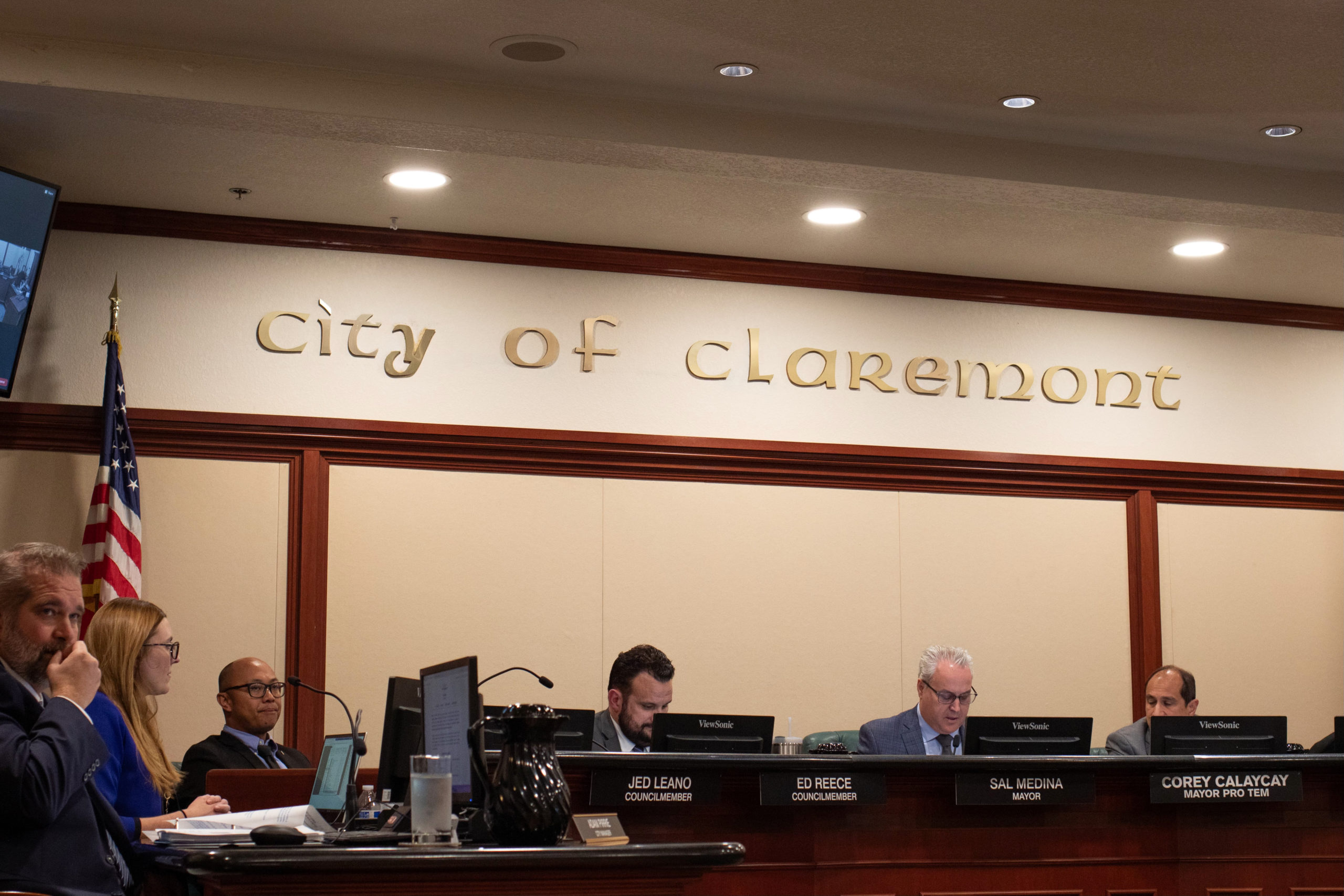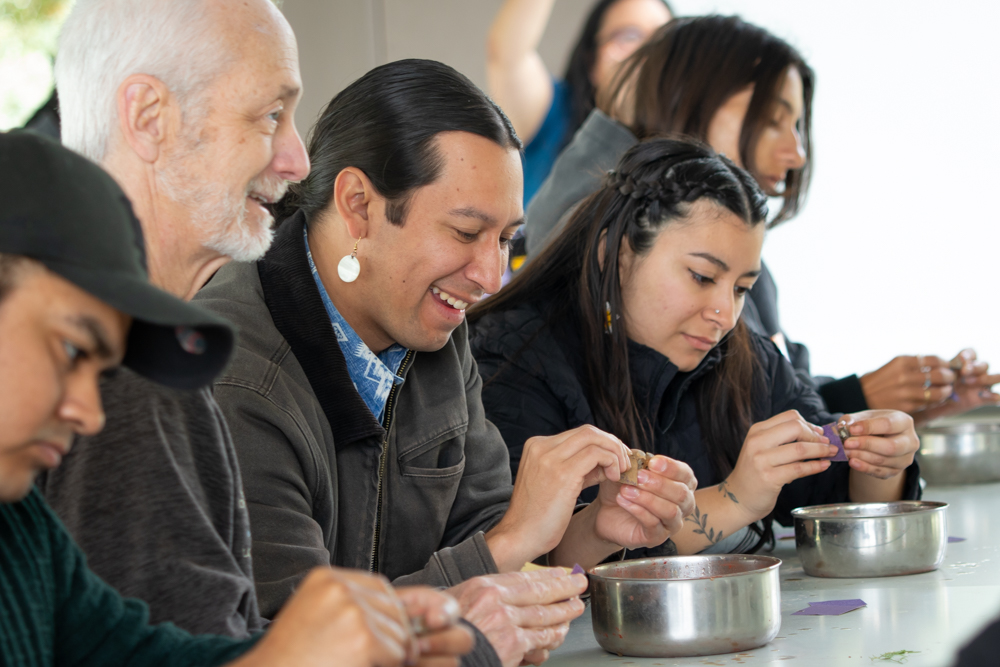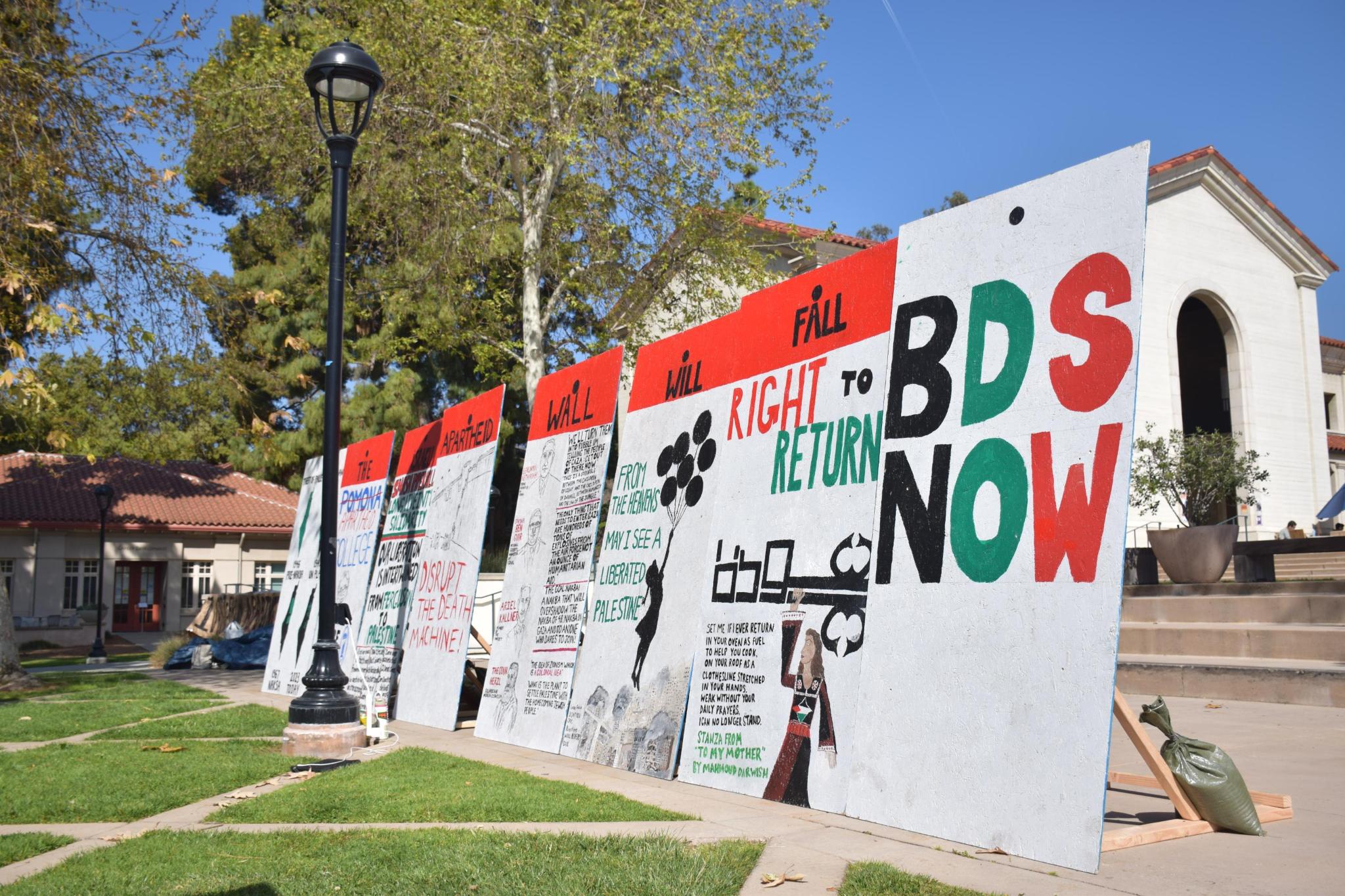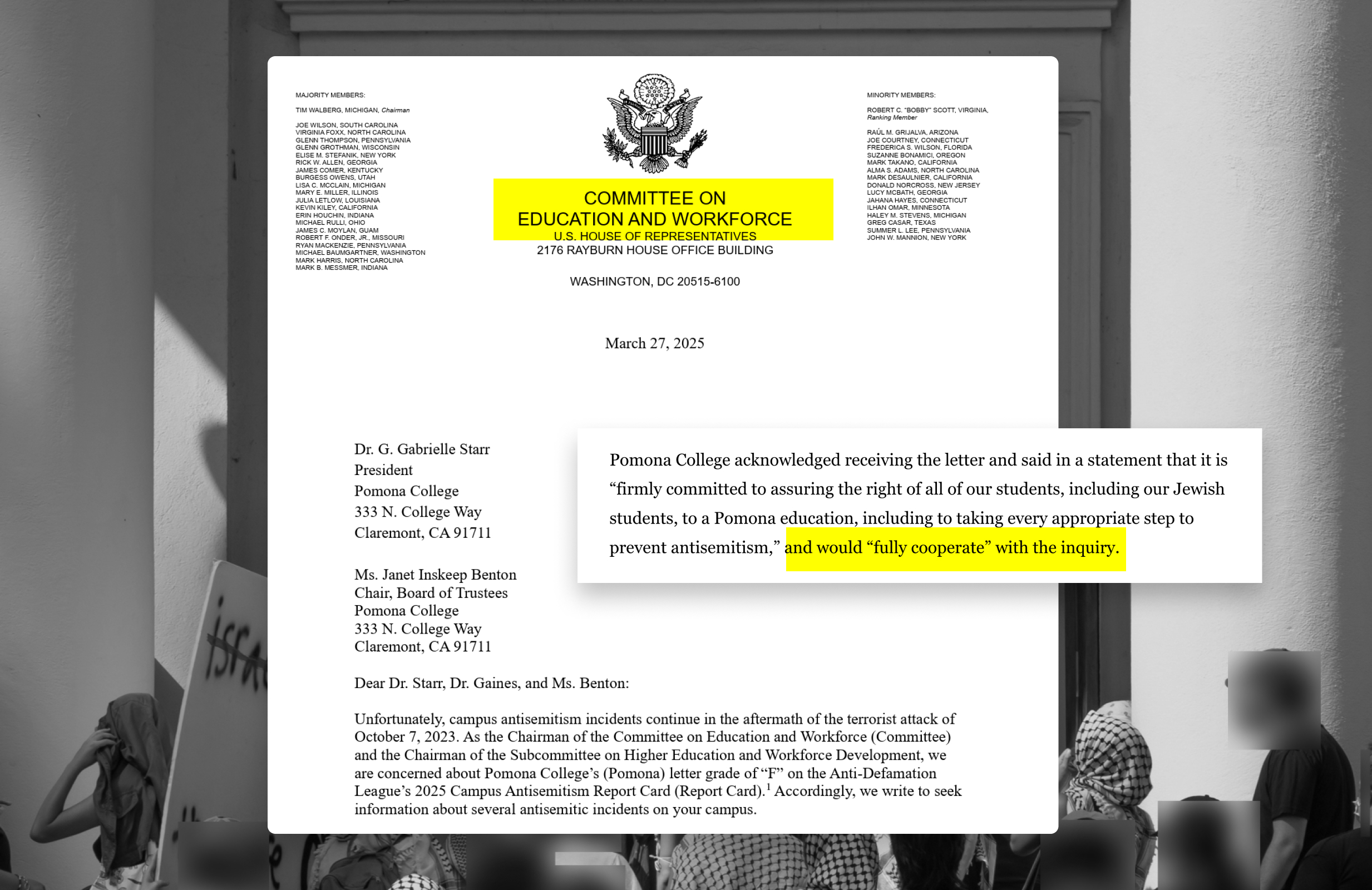
February 22, 2024
"What I experienced during that walk through was overwhelming support from my fellow community members in Claremont," a student organizer told the City Council.

Last week, Claremont Community for Palestine mobilized a group of over 80 community members to advocate for a ceasefire resolution at the Feb. 13 Claremont City Council meeting. After three students, a faculty member and over a dozen Claremont residents gave public comments, the city council agreed to consider a ceasefire resolution at their next meeting, Feb. 27.
The prior Sunday, the group of 5C students, faculty and local residents, organized a walk-through at the Claremont Farmers Market to gather community support for Palestine solidarity and to put pressure on the city of Claremont to pass a ceasefire resolution.
The group formed Nov. 27, with support from the Arab American Civic Council, after organizers from Asian American advocacy group 18 Million Rising reached out to a group of Claremont students, sharing the revelation that Representative Judy Chu, who implied in a congressional hearing that student protests at the Claremont Colleges were antisemitic, had a district office in Claremont.
The farmer’s market walkthrough, organized in collaboration with Socal for Ceasefire, was the group’s first in-person action to gather support and spread awareness in the broader Claremont community. Their flyers included a link to their petition for the Claremont City Council to pass a ceasefire resolution, which currently has over 300 signatures.
“We’re here today so that we can inform people of two things: one, the genocide is happening,” said Jaime Gutierrez Esq., a civil rights attorney based in Pomona and organizer with Socal for Ceasefire who took part in CC4P’s walkthrough. “And two, they can get involved. There is a way in which they can get involved. And that’s by showing up to City Council and asking them to do a ceasefire resolution at the minimum.”

At the city council meeting, Alex, a Pomona student who asked to be identified only by his first name for safety reasons, spoke about how supportive residents were during his walkthrough.
“You might be in a similar position, wondering what the people who don’t regularly talk to you think about the ceasefire resolution,” Alex said. “What I experienced during that walk through was overwhelming support from my fellow community members in Claremont. We didn’t just have to go up to people to ask them what they knew about the resolution and talk to them about the resolution, people were coming up to us all of the time to ask us what we were doing and how they could support.”
Since Oct. 7, Israeli forces have killed over 28,000 Gazans, including at least 12,150 children. On Feb. 11, Israel began bombarding the city of Rafah, which Israel previously designated a safe zone and where 1.5 of 2 million Gazans currently reside.
This Tuesday, the United States vetoed a U.N. Security Council resolution for a ceasefire in Gaza for the third time since Oct. 7. The resolution, which would be legally binding, was backed by the 22-nation Arab Group and 13 of the 14 other member nations in the Security Council.
Eventually, CC4P aims to pressure Chu to call for a ceasefire, oppose further U.S. military aid to Israel, condemn the portrayal of Palestinian, Muslim, Arab and SWANA people as “terrorists” and “articulate settler-colonial violence and occupation as root cause” of what she has called a “war” and “conflict.”
Chu previously called for the release of Israeli hostages in a statement in November. On Oct. 25, 2023, Representative Cori Bush introduced House Resolution 786, urging President Joe Biden to call for an immediate ceasefire and send humanitarian aid to Gaza. CC4P hopes Chu will co-sign the bill.
On Jan. 22, the neighboring Pomona City Council joined over 70 US cities, including Chicago, Seattle and San Francisco, in passing a ceasefire resolution, setting the precedent for organizers and other municipalities in the Inland Empire.
Before the Claremont City Council can consider and pass a similar resolution, one or more members of the council must agendize it in a prior public meeting.
Kenny, a Pitzer student and CC4P organizer who also asked to be identified only by his first name for safety reasons, spoke at the walkthrough about the importance of their plan to give public comments at last Tuesday’s City Council meeting.
“We think that this public comment session is really about making sure that the city council knows that we, the constituents and community members in Claremont, want to see a resolution in Claremont for an immediate and permanent ceasefire because we know that cities have leverage over our congresspeople, we know that cities have leverage internationally, and we also know that community members really want to see something that reflects our values,” he said. “We feel very confident that if we push, if we advocate for ourselves, and if we leverage and exercise our power, we can get this passed.”
Kenny was one of three students to give comments at the city council meeting, along with a faculty member and over a dozen Claremont community members.
“If we don’t do this, we are effectively silencing our community members in the most public way possible. And just as the city of Claremont has previously released statements in solidarity to anti-racism for black lives, a city resolution for an immediate and permanent ceasefire would offer us so much political leverage necessary to push our congressional representatives to believe in the preciousness of life, to establish a legacy for the City of Claremont, for the City Council,” he said at the meeting.
Dan Segal, professor of anthropology and history at Pitzer College, also spoke at the meeting, urging the city council to understand the gravity of the current moment.
“Genocide is not a time for business as usual. When it’s genocide, we do everything to try to stop it. We don’t stick with normal procedure. If people had finally not stuck with normal procedure in the 1930s, the Holocaust might not have unfolded,” Segal said.
The meeting ended with Councilmember Jennifer Stark pushing the council to agendize a ceasefire resolution for their upcoming Feb. 27 meeting. She received pushback from Councilmember Corey Calacay, who cited the council’s “long-standing practice” of not weighing in on political issues and international conflicts. Stark responded that the council also has a “long-standing practice of being responsive to the community,” and stated that she intended to use her power to unilaterally agendize the ceasefire resolution for the upcoming meeting: “I really hate being the only one going out on a limb asking staff to bring something forward, but there you have it.”
Accommodating both Stark and Calacay’s position, the council ultimately decided to agendize two possible resolutions as one item: a ceasefire resolution and an alternate resolution that would codify the council’s practice of not issuing resolutions on foreign affairs.
Claremont Community for Palestine aims to continue gathering the support and voices of the Claremont community for the upcoming meeting Feb. 27. A Feb. 15 Instagram post encourages community members to connect with council members to discuss the resolution, in particular by thanking Stark for her support in agendizing the resolution, and to join the group’s strategizing meetings in preparation for the next city council.
CC4P organizers have emphasized the support of the Claremont community and the responsibility of the Claremont City Council to hear out their constituents and recognize all of our complicity in an ongoing genocide being funded with our tax dollars. “We spend $445,328 of our tax payer dollars on Israeli genocide,” the group wrote in their Feb. 15 Instagram post, citing US Campaign for Palestinian Rights statistics and estimates. “Our tax dollars should be spent on our cities’ financial needs, not funding militarism abroad.”
Avrham, a Jewish Pomona resident who participated in the walkthrough, said that the public already supports a ceasefire.
“I know that the public is hungry for it,” Avrham said. “I’ve seen poll after poll for months showing that 80 percent Democrats want a ceasefire, 60 percent Independents, 54 percent Republicans. So that means everybody, right?”
For Kenny, the task is to connect with city council members as “our neighbors” and push them to use their power how their constituents want.
“I think that they really care about their communities, and I do firmly believe that they really care about what’s happening in Palestine,” Kenny said. “We might not have the exact same view on this, but I think it’s important to have these conversations and to also really demand that they do something under their authority. And I see real possibility in this—I think that we need to pursue every avenue possible to liberate Palestinians.”


Affinity groups

Palestine

Palestine

Undercurrents reports on labor, Palestine liberation, prison abolition and other community organizing at and around the Claremont Colleges.

Issue 1 / Spring 2023
Setting the Standard
How Pomona workers won a historic $25 minimum wage; a new union in Claremont; Tony Hoang on organizing
Read issue 1